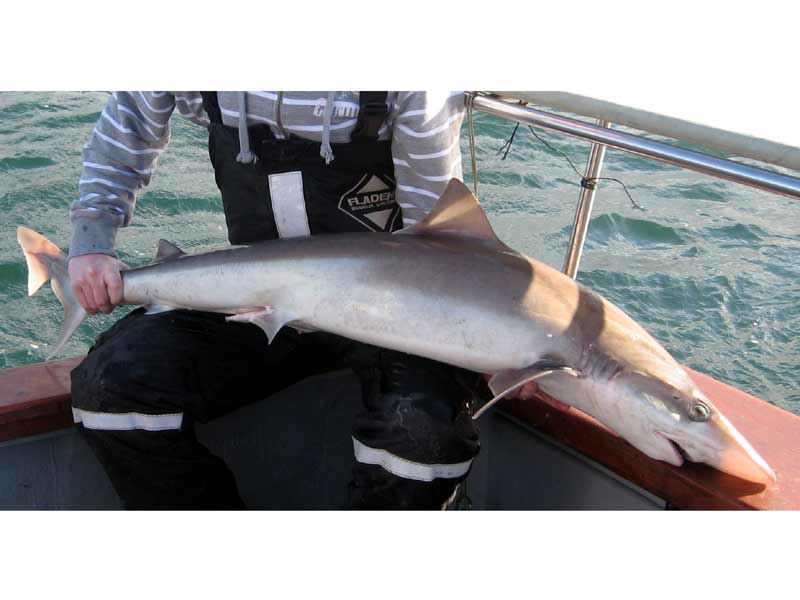Tope shark (Galeorhinus galeus)
Distribution data supplied by the Ocean Biodiversity Information System (OBIS). To interrogate UK data visit the NBN Atlas.Map Help
| Researched by | Morvan Barnes | Refereed by | Admin |
| Authority | (Linnaeus, 1758) | ||
| Other common names | - | Synonyms | - |
Summary
Description
Recorded distribution in Britain and Ireland
Widely distributed off the coasts of Britain and Ireland.Global distribution
-Habitat
The tope shark is a benthopelagic and demersal species inhabiting the upper continental shelf down to a depth of 550 m.Depth range
-Identifying features
- Slender hound shark reaching up to 190 cm in length.
- Shiny greyish-brown dorsal colouring and paler ventral surface.
- A long and pointed snout with large, oval, distinctly horizontal eyes.
- Similar sized second dorsal and anal fin.
- The caudal lobe is as long as the rest of the fin.
Additional information
No text enteredListed by
Bibliography
Compagno, L.J.V., 1984. FAO species catalogue. Vol. 4. Sharks of the world. An annotated and illustrated catalogue of shark species known to date. Part 1 - Hexanchiformes to Lamniformes. FAO Fisheries Synopsies, 125, 1-249
Froese, R. & Pauly, D., 2007. Fishbase. A global information system on fishes. [On-line] http://www.fishbase.org, 2008-02-18
Holden, M.J. & Horrod, R.G., 1979. The migrations of tope, Galeorhinus galeus L. in the eastern North Atlantic as determined by tagging. Journal du Conseil Permanent International pour l'Exploration de la Mer, 38, 314-317
Howson, C.M. & Picton, B.E., 1997. The species directory of the marine fauna and flora of the British Isles and surrounding seas. Belfast: Ulster Museum. [Ulster Museum publication, no. 276.]
Vas, P., 1995. A field guide to the sharks of British coastal waters. FSC Publications, Shrewsbury, UK.
Datasets
Fenwick, 2018. Aphotomarine. Occurrence dataset http://www.aphotomarine.com/index.html Accessed via NBNAtlas.org on 2018-10-01
Isle of Wight Local Records Centre, 2017. IOW Natural History & Archaeological Society Marine Records. Occurrence dataset: https://doi.org/10.15468/7axhcw accessed via GBIF.org on 2018-09-27.
Kent & Medway Biological Records Centre, 2017. Fish: Records for Kent. Occurrence dataset https://doi.org/10.15468/kd1utk accessed via GBIF.org on 2018-09-27.
Manx Biological Recording Partnership, 2017. Isle of Man wildlife records from 01/01/2000 to 13/02/2017. Occurrence dataset: https://doi.org/10.15468/mopwow accessed via GBIF.org on 2018-10-01.
Merseyside BioBank., 2018. Merseyside BioBank (unverified). Occurrence dataset: https://doi.org/10.15468/iou2ld accessed via GBIF.org on 2018-10-01.
NBN (National Biodiversity Network) Atlas. Available from: https://www.nbnatlas.org.
OBIS (Ocean Biodiversity Information System), 2025. Global map of species distribution using gridded data. Available from: Ocean Biogeographic Information System. www.iobis.org. Accessed: 2025-07-06
Scottish Shark Tagging Programme, 2018. Capture Mark Recapture Data for Scottish Elasmobranchs: 2009-2018. Occurrence dataset: https://doi.org/10.15468/znol4z accessed via GBIF.org on 2018-10-02.
South East Wales Biodiversity Records Centre, 2018. SEWBReC Fish (South East Wales). Occurrence dataset: https://doi.org/10.15468/htsfiy accessed via GBIF.org on 2018-10-02.
Citation
This review can be cited as:
Last Updated: 25/03/2008



